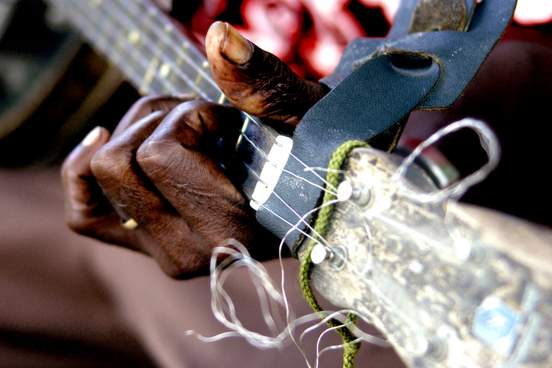
Arsy-varsy
Definition: backside forward : head over heels : TOPSY-TURVY
A non-reduplicative (yet still very cheeky) equivalent of arsy-varsy would be the expression ass over teakettle. However, arsy-varsy may be used as both adverb (modifying an action, as in the first example below) or an adjective (modifying a noun, as in the second) meaning “topsy-turvy” or “disordered.”
Only Reagan’s charm is authentic. Otherwise, as a voice or image on a screen, he’s always been the agent of someone else’s agenda. Part of America’s willingness to forgive him for the disasters of his administration may relate to the sense he gives of having been dragged in arsy-varsy, a secondary figure in his own career, along for the ride.
— Robert Stone, Harper’s Magazine, November 1988

Twingle-twangle
Definition: the twang of a musical instrument
A reduplication is a word formed by taking all or part of a word (usually its beginning), and repeating it, often (but not always) changing its vowel at the same time. Common reduplications include chitchat, buddy-buddy, jinglejangle and bonbon. But lexicographers have recorded many less familiar but still handy-dandy reduplications. Okey dokey, we’ll quit dillydallying and share a few, starting with twingle-twangle.
Twingle-twangle is a reduplication of twangle, meaning “a twanging sound.” Twang here means “to sound with a harsh quick ringing sound like that of a plucked banjo string.”
Twingle-twangle, twingle-twangle, went the harpers;
Ha-diddle, how-diddle, ha-diddle, how-diddle, went the pipers…
— “Old King Coul” (traditional nursery rhyme)

Dvandva
Definition: a class of compound words having two immediate constituents that are equal in rank and related to each other as if joined by and : a compound word belonging to this class (as bittersweet, secretary-treasurer, sociopolitical)
Dvandva, as you may have inferred from the definition above, is not a word you’re likely to encounter often, if ever again. It is also not, technically, a reduplication itself, but rather comes from a Sanskrit word, dvaṁdva (meaning “a pair” or “couple”) formed by reduplication of dva, meaning “two.” However, dvandva is so nice it’s worth saying twice, if we do say so ourselves.
In English, for instance, the coordinative or copulative relation which we see in a semi-syntactic compound like bittersweet (compare the phrase bitter and sweet), can be discerned also in asyntactic compounds like zigzag, fuzzywuzzy, choo-choo. Most asyntactic compounds seem to have a kind of attribute-and-head construction: door-knob, bulldog, cranberry. To the extent that one can carry out this comparison, one can therefore distinguish between copulative compounds (Sanskrit dvandva) and determinative (attributive or subordinative) compounds (Sanskrit tatpurusha); these divisions will cross those of syntactic, semi-syntactic, and asyntactic compounds.
— Leonard Bloomfield, Language (1933)

Hodmadod
Definition: a garden snail
Hodmadod (also sometimes spelled hodmedod, hodmandod, etc.) is a reduplication of the old English word dodman, meaning “snail” (not to be confused with hodman, referring to someone charged with carrying supplies to bricklayers or stonemasons on the job). In addition to referring to a snail, hodmadod has also been used to mean “scarecrow.” The origins of dodman are uncertain, but some have suggested that it is related to dod, a word in the dialect of northern England and southern Scotland for a rounded hill.
Across the county, the snail, known locally as hodmedod or dodman, was often called on by superstitious girls when they wanted to learn about their future husbands.
— Sylvia Kent, Folklore of Essex (2009)

Holus-bolus
Definition: all at once
The story of holus-bolus is not a hard one to swallow. Holus-bolus originated in English dialect in the mid-19th century and is believed to be a waggish reduplication of the word bolus. Bolus_ is from the Greek word bōlos, meaning "lump," and has retained that Greek meaning. In English, bolus has additionally come to mean "a large pill," "a mass of chewed food," or "a dose of a drug given intravenously." Considering this "lumpish" history, it's not hard to see how holus-bolus, a word meaning "all at once" or "all in a lump," came about.
Captain Fisher, the commander, with a party of young ladies from the city and gentlemen belonging to his ship, came one day to pay me a visit in the midst of a deluge of rain. I never saw it rain harder even in Australia. But they were out for fun, and rain could not dampen their feelings, however hard it poured. But, as ill luck would have it, a young gentleman of another party on board, in the full uniform of a very great yacht club, with brass buttons enough to sink him, stepping quickly to get out of the wet, tumbled holus-bolus, head and heels, into a barrel of water I had been coopering, and being a short man, was soon out of sight, and nearly drowned before he was rescued.
— Joshua Slocum, Sailing Alone Around the World (1899)

Hurr-bur
Definition: any of a genus (Arctium) of coarse composite herbs bearing globular flower heads with prickly bracts : burdock
Burdocks are fascinating plants. Native to Europe and Asia, many burdock species have been naturalized throughout North America, and though often regarded as weeds in the United States, can be cultivated for their edible roots (as they are in Asia). Their fruits are round burrs (or “burs”) that stick to clothing and fur. Hurr-bur is thought probably to be a reduplication of this burr. However, the reduplication hasn’t, uh, stuck over time; burdock is the more common name by several orders of magnitude.
Hurr-burr. Used in scorbutic, syphilitic, scrofulous, gout, and leprous diseases; the leaves as a cooling poultice.
— Druggist’s Hand-book of Medicinal Roots, Barks, Herbs, Flowers, &c. (1900)

Nievie-nievie-nick-nack
Definition: a child's guessing game
Oh, mirror in the sky: what is nievie-nievie-nick-nack? Can the child within our hearts play this game? Well, English speakers long ago weren’t afraid of changin’ their word nieve, meaning “hand” or “fist,” to nievie, reduplicating it and combining it with a variant of knickknack, because they’d built their language in part around such wordplay. But though time makes us bolder, even children get older, and we’re getting older, too. Now there’s Minecraft.
Nievie, nievie, nicknack,
Which hand will ye tak’?
Tak’ the right, or tak’ the wrang,
I’ll beguile ye, if I can.
— The Queen of Hearts, and Other Nursery Rhymes and Jingles_ (1883)

Mizmaze
Definition: a maze, or a state of confusion
Before it was a noun, maze was a verb meaning “to stupefy or daze,” traceable to Middle English and assumed to come from the Old English word masian (“to confuse.” Its first known use as a noun referring to “a confusing intricate network of passages” in English dates to the 14th century, with the reduplication mizmaze debuting a couple centuries later.
The “mizmaze” in the parish of Breamore, Hants, is an excellent example of the turf-labyrinths of which some twenty still remain in various parts of England, while records of others that have disappeared show that they must have been more numerous in former days.
— A. D. Hill, The Wiltshire Archaeological and Natural History Magazine (Vol. XXIX, 1896-97)

Zu-zu
Definition: a member of a Zouave regiment in the Civil War
Zu-zu was formed both by shortening and reduplication of the word Zouave, referring to a member of a particular form of light infrantry during the Civil War. Both the Union and the Confederacy had Zouave units, which modeled both their dress and their fighting style after similar French infrantry units that fought in northern Africa. Zouave comes from a French alteration of Zwāwa, a word in an Arabic dialect of Algeria referring to a Berber tribal confederation.
My love he is a Zou-zu, so gallant and bold,
He’s rough, and he’s handsome, scarce nineteen years old;
To show off in Washington, he has left his own dear,
And my heart is a breaking because he’s not here.
— Anonymous, “My Love He is a Zou-Zu,” The Universal Book of Songs and Singer’s Companion (1864)

Hurry-scurry
Definition: a confused rush: TURMOIL
If you’re unfamiliar with how to proceed orderly down a helter-skelter without turmoil, don’t let these instructions pass you by: when you get to bottom you go back to the top of the slide, where you stop and you turn and you go for a ride (we hear some of your long, long, long helter-skelters may feature as many as nine revolutions around their central tower!). What does this all have to do with hurry-scurry? Well, the particular form of the reduplication hurry-scurry is thought to have been influenced, perhaps, by helter-skelter. As both adverbs, adjectives, and nouns, they are synonymous, except there is no equivalent “twisty slide” sense of hurry-scurry. One thing hurry-scurry does have going for it, however, is that is gave English the verb scurry, meaning “to move in a brisk pace” or “to move around in a confused or agitated manner.” Isn’t that wild, honey pie?
The hurry-scurry of modern life leaves no one time to meditate among the tombs.
— Joseph Jacobs, The Dying of Death (1900)





